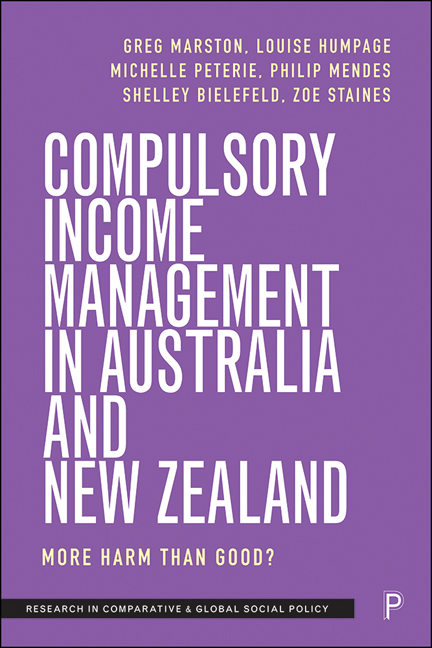Book contents
- Frontmatter
- Contents
- List of abbreviations
- About the authors
- Acknowledgements
- Series preface
- 1 Framing welfare conditionality
- 2 Why Income Management?
- 3 Barriers to implementing Compulsory Income Management
- 4 Identity and emotion
- 5 Procedural, consumer and contractual rights, and access to justice
- 6 Resistance and reform: individual and collective agency
- 7 Voluntary Income Management and financial education
- 8 Recalibrating social security and reimagining work
- References
- Index
7 - Voluntary Income Management and financial education
Published online by Cambridge University Press: 08 October 2022
- Frontmatter
- Contents
- List of abbreviations
- About the authors
- Acknowledgements
- Series preface
- 1 Framing welfare conditionality
- 2 Why Income Management?
- 3 Barriers to implementing Compulsory Income Management
- 4 Identity and emotion
- 5 Procedural, consumer and contractual rights, and access to justice
- 6 Resistance and reform: individual and collective agency
- 7 Voluntary Income Management and financial education
- 8 Recalibrating social security and reimagining work
- References
- Index
Summary
‘I got put on it [IM] because I needed to learn financial responsibility. … But yeah, we found being on it— it didn't really help. It actually restricted it a lot more.’ (Tamsyn, Playford)
Introduction
A central conclusion of this comparative empirical study is that IM in Australia and New Zealand does more harm than good. Being placed on IM has made many feel infantilised, having been compelled into a system that was not of their choosing and which exacerbates rather than alleviates economic insecurity. Nevertheless, despite uncovering a general and strong aversion to compulsory IM schemes, this research has also found some support for voluntary IM. Some IM participants and community stakeholders in both countries saw voluntary IM as having potential to return an important sense of agency to welfare recipients while offering an avenue of support for those who find IM useful for budgeting. Nevertheless, many of the research participants also held the view that different approaches were needed to build financial capability and address poverty; that IM alone could not achieve this objective. Many touched on the need to raise the base rate of unemployment benefits to an amount that would alleviate (rather than create or exacerbate) poverty. Others described the potential benefit of financial counselling and education, which would align with the IM objectives of strengthening financial knowledge and behaviours while avoiding the hard paternalism associated with compulsory IM schemes.
In this chapter, the focus turns towards the possibility of voluntary IM and financial education as alternatives to compulsory IM. This discussion is placed in the foreground by drawing on public health literature to explore links between economic insecurity and mental and physical health and wellbeing, briefly reviewing the findings in relation to the impacts of compulsory IM on economic insecurity. A critical discussion of the question of voluntary IM follows, in which the empirical data are drawn on to consider the possible strengths and weaknesses of an entirely voluntary IM scheme. The latter part of the chapter explores other evidence-based means of building financial management skills, which could work alongside voluntary IM or alone. In particular, insights are drawn from the research literature on poverty reduction to assess the possible efficacy of financial education, before its use alongside IM is critically discussed
- Type
- Chapter
- Information
- Compulsory Income Management in Australia and New ZealandMore Harm than Good?, pp. 147 - 167Publisher: Bristol University PressPrint publication year: 2022



